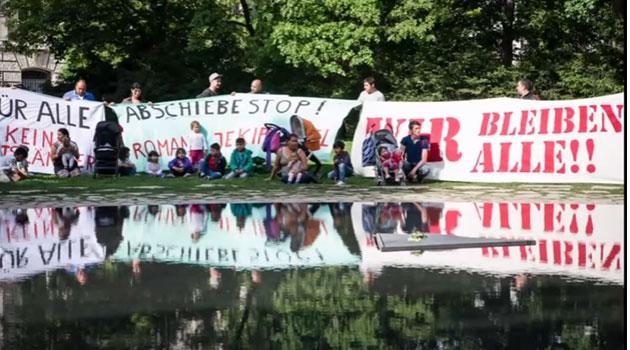Germany: Romani refugees occupy Berlin memorial to Roma murdered during Nazism, police intervene

Last Sunday afternoon approximately 100 people occupied Berlin’s memorial to the Romani and Sinti people who were murdered by the Nazis. The protest was held under the slogan "We Are Here".
Roughly 30 Romani refugees who are at risk of being forcibly expelled from Germany, including families with young children, were among the demonstrators. They said they wanted to draw attention to their desperate situations and to the tightening of conditions for providing asylum in Germany.
Most are from Bosnia and Herzegovina, Kosovo, Macedonia, Montenegro, or Serbia, i.e., countries the German Government recently said it now considers to be "safe countries of origin". Prior to the demonstration the protesters left the refugee camps where, by law, they are meant to wait for deportation.
The refugees said they planned to spend the night at the memorial. They were drawing attention to the fact that a 2014 amendment to Germany’s asylum law was recently tightened due to the big number of refugees from Africa and Asia newly arriving in Germany and has now led to police deporting more and more Romani people in recent months, including children who have never spoken the official languages of the countries to which they are "returning", many of whom have never even been to those countries before.
The main demands of last weekend’s protest were integration programs, language courses, and the "unconditional right to remain". According to the demonstrators, the German Government is ignoring the discrimination and social exclusion Romani people frequently face in the countries to which they will now be returned.
"No alms from Western Europe will solve our problems there – the solution must be here, we demand acknowledgment of the reasons for our having fled according to the Geneva Convention [for refugee protection] and the application of European law, because the tradition of persecuting us is a European problem," the demonstrators’ press release reads. Various institutions such as the United Nations High Commissioner on Refugees (UNHCR), the German Human Rights Institute and many nonprofit organizations also warn that the tightening of the law will led to all asylum-seekers’ eligibility no longer being assessed individually, but across the board on the basis of their ostensibly coming from a designated "safe country".
Representatives of German Roma disagree with choice of protest site
The protest was spontaneous and not announced to the authorities – the Foundation Memorial to the Murdered Jews of Europe, which administers the monument, said it also had not been informed in advance of the action. Representatives of the Foundation, together with representatives of German Roma and Sinti, negotiated with the demonstrators for six hours last Sunday about the eventual fulfillment of their demands and ending their action at the memorial.
Romani Rose, chair of the Central Council of German Sinti and Roma, participated in the negotiations by telephone, stating that: "The memorial is a place for the dignified commemoration of more than half a million murdered Romani and Sinti people in Nazi-occupied Europe. That place cannot and must not be abused for political protest actions."
Rose also called on politicians to take the desperate situation of these people into account. "Families are being deported into hopeless situations where they will have no chance of a dignified life or an education," he said.
After nightfall the protesters failed to obey police instructions to end their action or move it elsewhere. Primarily because those participating included newborns and women who are unwell, the Foundation said it decided to ask police to use force to end the protest action in order to protect those vulnerable participants.
The request was made after Norbert Lammert, president of the Federal Parliament, reached agreement with the chair of the Foundation’s curatorial board. Several men defended themselves against the police intervention, but after a brief interval the police took them to police stations, interrogated them, and released them.
According to the German daily Die Taz, criminal charges were filed against two Romani men and one non-Romani activist for rioting and suspicion of committing violence against a state official. A different source has reported that the police are intentionally not beginning any prosecutions of the protesters.
The administrator of the memorial has objected that to do so would damage the memorial’s own interests. Some families and individuals who attended the protest left and found temporary shelter that night in "hausprojekts" elsewhere in Berlin – buildings where young people attempt alternative forms of housing.